|
|
|
Sort Order |
|
|
|
Items / Page
|
|
|
|
|
|
|
| Srl | Item |
| 1 |
ID:
144220
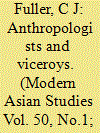

|
|
|
|
|
| Summary/Abstract |
The anthropology of caste was a pivotal part of colonial knowledge in British India in the late nineteenth and early twentieth centuries. Denzil Ibbetson and Herbert Risley, then the two leading official anthropologists, both made major contributions to the study of caste, which this article discusses. Ibbetson and Risley assumed high office in the imperial government in 1902 and played important roles in policy making during the partition of Bengal (1903–5) and the Morley-Minto legislative councils reforms (1906–9); Ibbetson was also influential in deciding Punjab land policy in the 1890s. Contemporary policy documents, which this article examines, show that the two men's anthropological knowledge had limited influence on their deliberations. Moreover, caste was irrelevant to their thinking about agrarian policy, the promotion of Muslim interests, and the urban, educated middle class, whose growing nationalism was challenging British rule. No ethnographic information was collected about this class, because the scope of anthropology was restricted to ‘traditional’ rural society. At the turn of the twentieth century, colonial anthropological knowledge, especially about caste, had little value for the imperial government confronting Indian nationalism, and was less critical in constituting the Indian colonial state than it previously had been.
|
|
|
|
|
|
|
|
|
|
|
|
|
|
|
|
| 2 |
ID:
090705
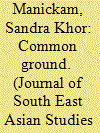

|
|
|
|
|
| Publication |
2009.
|
| Summary/Abstract |
This article explores the common bases of knowledge on race among Malay intellectuals and British scholar-officials in British Malaya. It focuses on genealogies of knowledge that not only lead back to Europe, but to contexts in the Malay Archipelago, encompassing both coloniser and colonised as agents of production of colonial knowledge on race. Race was a strategy adopted by Malay intellectuals in a colonial milieu, in line with histories and conditions before and during the period of British control over Malaya. The notion of complicities is explored in studying the interaction between British and Malay intellectuals which produced colonial knowledge on race.
|
|
|
|
|
|
|
|
|
|
|
|
|
|
|
|
| 3 |
ID:
126137
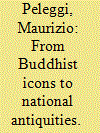

|
|
|
|
|
| Publication |
2013.
|
| Summary/Abstract |
In the mid 1920s Prince Damrong Rajanubhab and George Coedès jointly formulated the stylistic classification of Thailand's antiquities that was employed to reorganize the collection of the Bangkok Museum and has since acquired canonical status. The reorganization of the Bangkok Museum as a 'national' institution in the final years of royal absolutism responded to increasing international interest in the history and ancient art of Southeast Asia, but represented also the culmination of several decades of local antiquarian pursuits. This paper traces the origins of the art history of Thailand to the intellectual and ideological context of the turn of the twentieth century and examines its parallelism to colonial projects of knowledge that postulated a close linkage between race, ancestral territory and nationhood.
|
|
|
|
|
|
|
|
|
|
|
|
|
|
|
|
| 4 |
ID:
146794
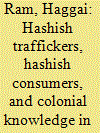

|
|
|
|
|
| Summary/Abstract |
I examine the extent to which the rise in the early 1900s of international efforts to stamp out or regulate the flow and (ab)use of hashish affected the (under)world of hashish traffickers and hashish consumers in Mandatory Palestine. A crucial phase in the global fight against cannabis, the Mandatory period serves as an excellent arena for exploring the local reverberations triggered by the reversal of the course of ‘the psychoactive revolution’, a revolution that has made drugs pervasive in human societies from the seventeenth to the nineteenth centuries. I begin by examining how hashish traffickers responded to these new conditions of control and prohibition, showing that their persistence in maintaining the illicit trade presented the authorities with unforeseen challenges. I then provide a vista into Mandatory Palestine's consuming subjects and the kinds of colonial knowledge about cannabis which helped to raise critical, racial-cum-cultural, awareness of these people, as well as to deter Jews from consuming the forbidden substance. As opposed to other regions of the British Empire (most notably India and Egypt), the history of cannabis in Palestine has not been told before. By drawing on previously untapped archival, press and literary sources, this article seeks to rectify this lacuna.
|
|
|
|
|
|
|
|
|
|
|
|
|
|
|
|
| 5 |
ID:
131412
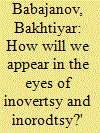

|
|
|
|
|
| Publication |
2014.
|
| Summary/Abstract |
This article offers a close reading of several unpublished manuscripts by the Russian Orientalist, administrator and missionary ideologue Nikolai Petrovich Ostroumov, who spent most of his career in the Turkestan governor-generalship. Ostroumov's violent Islamophobia and close relationship with the colonial administration support to some extent the thesis of Edward Said and other postcolonial theorists that European views of the 'Orient' were an epistemological construction of negative attributes that reflected European self-perceptions, and that academic Orientalism was often the handmaiden of colonial power and expansion. However, much of Ostroumov's writing was so abstract and divorced from the social and political realities of Turkestani society that it was of little practical use, something compounded by his view of Orthodox Christianity and Islam as polar opposites. Ostroumov's private writings reveal a deep anxiety regarding the durability of Russian conquest and rule in Central Asia, and paranoia about the decline and destruction of the Christian faith and European civilization.
|
|
|
|
|
|
|
|
|
|
|
|
|
|
|
|
| 6 |
ID:
187280
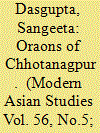

|
|
|
|
|
| Summary/Abstract |
This article explores nineteenth-century colonial representations of the Oraons of Chhotanagpur. Described in administrative reports of early nineteenth-century Chhotanagpur as mlecchha and dhangar, or as part of a ‘village community’ of Coles/Kols, these Oraons, by the late nineteenth century, were referred to as a ‘tribe’. To trace the categories through which the Oraons journeyed across colonial records, I discuss texts and reports which later became part of bureaucratic memory. The shifts within official understanding, I argue, were related to the working of official minds, changing assumptions, and differing languages; the tensions within the discipline of anthropology and its application in the colony; the variations within ideologies of governance and the imperatives of rule; and interactions with ‘native’ informants and correspondents, along with personal observations of local practices. There remained, however, an uneasy tension between wider intellectual trends in Europe and their reverberations in the colony, and the experiences of governance: colonial knowledge was not always produced with arrogance and assurance but also with doses of uncertainty, hesitation, disquiet, and often despair. In the shifting representations of the tribe across the nineteenth century, there is, I suggest, a pattern. In the pre-1850s, local nomenclature was adopted and voices of dissent—expressed through agrarian protests in Chhotanagpur—were addressed. By the 1850s, the utilitarian agenda structured colonial imaginaries and interventions. The 1860s witnessed the interplay of ethnological concerns, missionary beliefs, and Arcadian principles. From the 1890s, the idea of tribe was overwhelmingly structured by the supremacy of disciplinary knowledge systems that increasingly supplanted the role of the ‘native’ informant.
|
|
|
|
|
|
|
|
|
|
|
|
|
|
|
|
| 7 |
ID:
097727
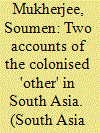

|
|
|
|
|
| Publication |
2010.
|
| Summary/Abstract |
Taking examples from South Asia, this article shows how British colonial knowledge about the non-European 'other' hinged substantially on the participation of sections of that other, especially in the context of liminal groups, for whom no ready standardised formula of identification was available. Development of a colonial episteme often involved active intervention from the colonised body, thereby dispelling any strict notion of coloniser-colonised alterity and mere top-down governance. This process of identity construction took place in several arenas and also involved negotiations in courts of law, where rival sections of the amorphous colonised body fought for competing ideals of selfhood. Complementing this legal construction were ethnographic formulations, internally diverse, and often relating to broader politico-intellectual concerns and debates of the Empire, at different planes in different ways. The article explicates their theoretical bases and practical modalities.
|
|
|
|
|
|
|
|
|
|
|
|
|
|
|
|
|
|
|
|
|